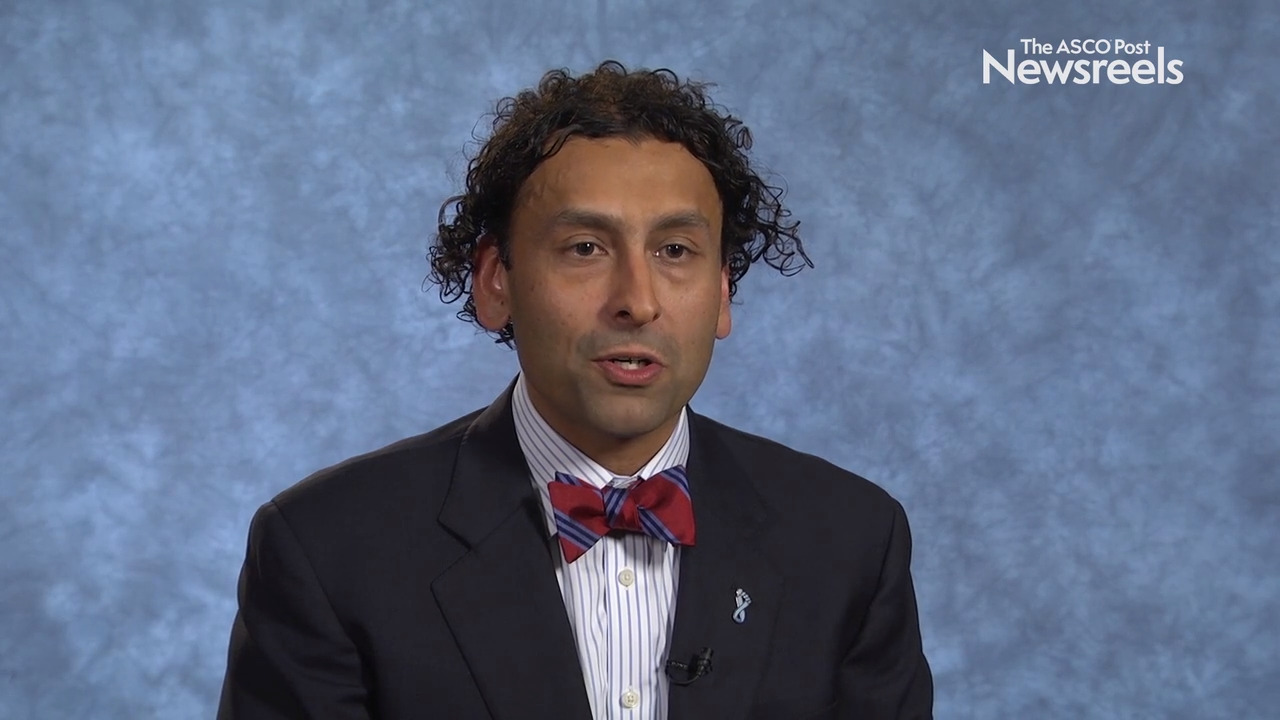NCCN Clinical Practice Guidelines in Oncology: 2019 Updates
In 1996, the National Comprehensive Cancer Network® (NCCN®) published its first set of Clinical Practice Guidelines in Oncology (NCCN Guidelines®), covering eight tumor types. NCCN Guidelines are now published for more than 70 tumor types and topics. Some of the key updates for 2019 were presented...
HPV DNA and Outcomes After Primary Treatment for Oral and Oropharyngeal Squamous Cell Carcinomas
In a two-institution study reported in JAMA Oncology, Fakhry et al found that persistent detection of tumor-type human papillomavirus (HPV) DNA after primary treatment for oral and oropharyngeal squamous cell carcinomas was associated with poorer outcomes. Study Details The prospective study...
Oropharyngeal Cancer Trends in White Men
In a study reported in the Journal of Clinical Oncology, Tota et al found that there has been a reduction in the increase of oropharyngeal cancer among young white men, with a high number of cases projected among older white men in coming years. As stated by the investigators, “Human...
Doxepin or Diphenhydramine/Lidocaine/Antacid Mouthwash for Radiotherapy-Related Oral Mucositis Pain
In the phase III Alliance A221304 trial reported in JAMA, Sio et al found that doxepin mouthwash and diphenhydramine/lidocaine/antacid mouthwash reduced oral mucositis pain for the first 4 hours after administration in patients with oral mucositis pain from head and neck radiotherapy, but the...
Lenvatinib in Recurrent or Metastatic Adenoid Cystic Carcinoma
In a single-center phase II study reported in the Journal of Clinical Oncology, Tchekmedyian et al found that the multitargeted tyrosine kinase inhibitor lenvatinib was active in progressive recurrent or metastatic adenoid cystic carcinoma. Study Details In the study, 32 evaluable patients at...
I Was Not Prepared for the Emotional Toll of Cancer
In 1996, an excruciating sore throat sent me first to my primary care physician and then to an ear, nose, and throat specialist, after a suspicious mass was found on the right side of my throat. A biopsy determined that the tumor was squamous cell neck cancer, and additional tests of my neck,...
AACR 2019: Effect of Timing of Radiotherapy on Mucositis in Patients With Head and Neck Cancer
New research presented by Gu et al at the American Association for Cancer Research (AACR) Annual Meeting 2019 found that administering radiation treatments in the morning as opposed to later in the day may significantly reduce the severity of mucositis and its related impacts (Abstract 4860). ...
New ASCO Guideline on Head and Neck Cancer Clarifies Lymph Node Management
A NEW ASCO guideline, “Management of the Neck in Squamous Cell Carcinoma of the Oral Cavity and Oropharynx: ASCO Clinical Practice Guideline,” aims to clarify issues in lymph node management.1 “This guideline represents a true multidisciplinary synthesis of some important new information about...
Intracranial Malignancy After Stereotactic Radiosurgery for Nonmalignant Conditions
In a retrospective cohort study reported in The Lancet Oncology, Douglas Kondziolka, MD, of NYU Langone Health System, and colleagues found that patients undergoing Gamma Knife stereotactic radiosurgery for nonmalignant neurosurgical conditions did not appear to be at long-term increased risk of...
Effect of PET/CT on Surgical Planning for Head and Neck Cancer
In a study reported in the Journal of Clinical Oncology, Lowe et al found that 18F-fluorodeoxyglucose positron-emission tomography/computed tomography (PET/CT) had a high negative predictive value in the clinically N0 neck in patients with newly diagnosed head and neck squamous cell carcinoma, with ...
In Era of Immunotherapy, Radiation Therapy May Become Essential Component of Systemic Treatments of Cancer
“IN THIS era of immunotherapy, it is highly possible, and potentially probable, that radiation therapy may become not just a form of locoregional and palliative treatment, but an essential component of our systemic treatments of cancer,” according to Zachary S. Morris, MD, PhD, Vice-Chair,...
Immunotherapy for Head and Neck Cancer Expands, but Concerns Persist About Patient Selection and Toxicities
SOME PATIENTS with advanced head and neck cancer may achieve durable responses with immunotherapy, and recent trial results suggest first-line immunotherapy may increase survival among patients with recurrent or metastatic disease. However, concerns remain about selecting patients most likely to...
FDA Pipeline: Priority Reviews in Renal Cell Carcinoma and Head and Neck Cancer
Over the past week, the U.S. Food and Drug Administration (FDA) granted multiple Priority Reviews: Pembrolizumab in Combination With Axitinib as First-Line Treatment for Advanced Renal Cell Carcinoma Today, the FDA accepted and granted Priority Review for a new supplemental biologics license...
Small Study Investigates Rise of Glottic Carcinoma in Young Adults and HPV Infection
An increase in the diagnosis of glottic carcinoma in young adults may be due in part to infection with strains of human papillomavirus (HPV). Investigators from Massachusetts General Hospital (MGH) described finding HPV infection in all tested samples of glottic carcinoma from 10 patients diagnosed ...
Andecaliximab in Untreated Gastric or Gastroesophageal Junction Cancer
The large phase III GAMMA-1 trial failed to replicate the encouraging findings from a previous smaller study of andecaliximab plus chemotherapy in untreated HER2-negative gastric or gastroesophageal junction adenocarcinoma, according to Manish A. Shah, MD, of Weill Cornell Medicine/New York...
KEYNOTE-181: Pembrolizumab vs Chemotherapy in Second-Line Treatment of Advanced Esophageal Cancer
In the global phase III KEYNOTE-181 trial, pembrolizumab as second-line therapy for advanced esophageal cancer did not improve overall survival in the whole population, vs chemotherapy, but did improve survival for patients with strong expression of programmed cell death ligand 1 (PD-L1),...
2019 GI Cancers Symposium: Pembrolizumab in Second-Line Therapy for Advanced Esophageal Cancer
Pembrolizumab significantly improved overall survival in the second-line setting of advanced esophageal cancer in patients whose tumors tested positive for programmed cell death ligand 1 (PD-L1) with a combined positive score (CPS) of 10 or greater. This was compared to investigator’s choice...
Study Finds World Trade Center Responders May Be at Increased Risk for Head and Neck Cancers
A study by Graber et al in the International Journal of Cancer has found a significant increase in head and neck cancers among workers and volunteers who responded to the September 11 terrorist attacks on the World Trade Center (WTC), pointing to newly emerging risks that require ongoing monitoring ...
Response to Induction Chemotherapy and Outcomes With Definitive Chemoradiotherapy or Surgery in Sinonasal Undifferentiated Carcinoma
In a single-center experience reported in the Journal of Clinical Oncology, Amit et al found that among patients with sinonasal undifferentiated carcinoma with a favorable response to induction chemotherapy, disease-specific survival was better in those receiving definitive concurrent...
Study Identifies Prognostic Biomarker in HPV-Related Head and Neck Cancers
A study investigating how to identify and treat patients with high- and low-risk human papillomavirus (HPV)-related oropharyngeal squamous cell carcinoma has demonstrated variations in HPV-related molecules among HPV-positive cases of the disease. Using their findings, the investigators developed a ...
Facing Death: Having the Difficult Conversation With Your Patients
Michael Becker, a former CEO for two biotechnology companies, discusses his terminal head and neck cancer diagnosis and his message for oncologists: be proactive and, at the appropriate time, talk with your patients about death and dying. For more information about Michael Becker’s blog and his HPV vaccine advocacy, visit mdbcancerjourney.com. To read about Michael Becker's advocacy efforts to increase vaccination rates for human papillomavirus-related cancers, see his Patient's Corner column "HPV-Related Cancers Like Mine Are Avoidable, So Why Aren't More Kids Being Vaccinated?" published in the May 10, 2018 issue of The ASCO Post.
Pembrolizumab Plus Chemoradiotherapy in HPV-Positive Head and Neck Cancer
The addition of pembrolizumab (Keytruda) to a chemoradiotherapy regimen yielded complete response rates of 85% in patients with human papillomavirus (HPV)-positive advanced squamous cell carcinoma of the head and neck. These findings from a phase Ib study were presented at the 2018 Society for...
Radiotherapy Plus Cetuximab or Cisplatin in HPV-Positive Oropharyngeal Carcinoma
In a noninferiority phase III trial (NRG Oncology RTOG 1016) reported in The Lancet, Gillison et al found that radiotherapy plus cetuximab (Erbitux) was associated with poorer overall survival vs radiotherapy plus cisplatin in patients with human papillomavirus (HPV)-positive oropharyngeal...
Pembrolizumab vs Standard of Care in Recurrent or Metastatic Head and Neck Squamous Cell Carcinoma
In the phase III KEYNOTE-040 trial reported in The Lancet, Cohen et al found that pembrolizumab (Keytruda) was associated with a “clinically meaningful prolongation of overall survival” vs investigator’s choice of standard therapies in patients with previously treated recurrent or ...
New Glioblastoma Translational Center at Penn Medicine
Penn Medicine has announced a new Translational Center of Excellence in the Abramson Cancer Center, focused on glioblastoma multiforme. The team will investigate new immune therapies for glioblastoma and, in particular, design and test new chimeric antigen receptor (CAR) T-cell therapies. “Penn...
Radiotherapy With Cisplatin or Cetuximab in Low-Risk, HPV-Positive Oropharyngeal Cancer
In the phase III De-ESCALaTE trial reported in The Lancet, Mehanna et al found no difference in severe toxicity with cisplatin vs cetuximab (Erbitux) plus radiotherapy in low-risk human papillomavirus (HPV)-positive oropharyngeal cancer. Cetuximab was associated with poorer recurrence and survival...
Multigene Classifier Test for Thyroid Nodules With Indeterminate Cytology
In a study reported in JAMA Oncology, Steward et al found that the use of a multigene genomic classifier test (ThyroSeq v3) could reduce the need for diagnostic surgery in a substantial proportion of patients with thyroid nodules with indeterminate cytology. The blinded prospective cohort...
DNA Vaccine Leads to Immune Responses in HPV-Related Head and Neck Cancer in Small Study
A therapeutic vaccine may boost antibodies and T cells, helping them infiltrate human papillomavirus (HPV)-related head and neck cancer tumors. Researchers from the Abramson Cancer Center of the University of Pennsylvania tested the immunotherapy in two groups of patients with advanced head and...
Pazopanib Plus Cetuximab in Metastatic Head and Neck Squamous Cell Carcinoma
As reported in The Lancet Oncology by Douglas Adkins, MD, of Washington University School of Medicine, Division of Medical Oncology, and colleagues, the addition of the angiogenesis inhibitor pazopanib (Votrient) to cetuximab (Erbitux) in a phase Ib and expansion cohort study showed activity in...
Phase III Study Supports Use of Cisplatin Over Cetuximab in HPV-Positive Oropharyngeal Cancer
In the United States and European countries, many oncologists are using cetuximab (Erbitux)/radiotherapy instead of cisplatin/radiotherapy in the treatment of human papillomavirus (HPV)-positive oropharyngeal cancer, based on the belief that cetuximab is equally effective with less toxicity than...
Pembrolizumab Improves Survival in Advanced Head and Neck Cancer
An overall survival advantage has now been shown for first-line immunotherapy in recurrent or metastatic head and neck cancer, researchers reported at the European Society for Medical Oncology (ESMO) 2018 Congress.1 In the phase III KEYNOTE-048 trial, treatment with the anti–programmed cell death...
Ivy Brain Tumor Center to Study Treatments for Brain Malignancies
The Ben and Catherine Ivy Foundation, in partnership with the Barrow Neurological Institute in Phoenix, has awarded a $50 million grant to establish a new translational science program focusing on early-phase, pharmacodynamic- and pharmacokinetic-driven clinical trials for aggressive brain tumors. ...
Durvalumab With or Without Tremelimumab in Recurrent or Metastatic HNSCC With Low/No PD-L1 Expression
In a randomized phase II trial reported in JAMA Oncology, Siu et al found that the combination of the programmed cell death ligand 1 (PD-L1) inhibitor durvalumab (Imfinzi) plus the cytotoxic T-lymphocyte–associated protein 4 (CTLA-4) inhibitor tremelimumab and durvalumab alone showed evidence ...
Suicide Risk Among Head and Neck Cancer Survivors
In a study reported in Cancer, Osazuwa-Peters et al found that the mortality rate from suicide among head and neck cancer survivors was twice as high as the pooled rate in survivors of 19 other cancers considered in the study. Only the rate of suicide in pancreatic cancer survivors was higher...
2018 ASTRO: Liquid Biopsy in HPV-Associated Oral Cancer Surveillance
A highly sensitive blood test that detects minute traces of cancer-specific DNA has been shown to accurately determine whether patients with human papillomavirus (HPV)-related oropharyngeal squamous cell carcinoma (OPSCC) are free from cancer following radiation therapy. Findings were presented by...
Thomas Galloway, MD, on Oropharyngeal Cancer: Improving Outcomes and Reducing Toxicity
Thomas Galloway, MD, of Fox Chase Cancer Center, summarizes a session on head and neck cancer that included findings on reducing oral mucositis, improving quality of life with deintensified chemoradiotherapy, and the costs of dose de-escalation (Scientific Session 31).
Bhisham Chera, MD, on Oropharyngeal Cancer: Expert Perspective on Surveillance
Bhisham Chera, MD, of the University of North Carolina, discusses using human papillomavirus found in plasma circulating tumor DNA to monitor cancer recurrence in HPV-associated oropharyngeal cancer (Abstract LBA6).
2018 ASTRO: Combined Radiation and Cisplatin in HPV-Related Head and Neck Cancer
A phase III trial has determined that cisplatin chemotherapy combined with radiation therapy showed high amounts of activity in human papillomavirus (HPV)-related head and neck cancer. Findings from NRG-RTOG 1016 were presented by Trotti et al the 60th Annual Meeting of the American Society for...
ESMO 2018: First-Line Immunotherapy for Recurrent or Metastatic Head and Neck Squamous Cell Carcinoma
Pembrolizumab (Keytruda) improved survival in patients with head and neck cancer that has recurred or metastasized in the KEYNOTE-048 trial, according to late-breaking results from the study reported by Burtness et al at the European Society for Medical Oncology (ESMO) 2018 Congress (Abstract...
ESMO 2018: Cetuximab vs Cisplatin in Patients With HPV-Positive Oropharyngeal Cancer Receiving Radiotherapy
Patients with human papillomavirus (HPV)-positive throat cancer responded better to chemoradiotherapy than to cetuximab (Erbitux) with radiotherapy, according to late-breaking research reported by Mehanna et al at the European Society for Medical Oncology (ESMO) 2018 Congress (Abstract LBA9_PR)....
The Sontag Foundation: Turning a Difficult Diagnosis Into Action to Benefit Patients With Brain Cancer
When Frederick B. Sontag’s wife, Susan, was diagnosed in 1994 with grade III astrocytoma, the couple was understandably overwhelmed to hear that her expected survival was 3 years. At that time, there were few organizations providing resources to patients with brain tumors and their families. While...
Ezra E.W. Cohen, MD, on Head and Neck Cancer: Using Curative Immunotherapy
Ezra E.W. Cohen, MD, of the University of California, San Diego, discusses the effectiveness of anti–PD-1 therapy in patients with recurrent head and neck cancer and the studies that might help predict who will benefit, how to combine agents, and ways to reduce long-term toxicity.
DNA Vaccine Leads to Immune Responses in HPV-Related Head and Neck Cancer in Small Study
A therapeutic vaccine may boost antibodies and T cells, helping them infiltrate human papillomavirus (HPV)-related head and neck cancer tumors. Researchers from the Abramson Cancer Center of the University of Pennsylvania tested the immunotherapy approach in two groups of patients with...
Low- vs High-Dose Cisplatin Chemoradiotherapy in Squamous Cell Carcinoma of the Head and Neck
In an analysis of Veterans Affairs data reported in the Journal of the National Cancer Institute, Bauml et al found that weekly lower-dose cisplatin vs higher-dose cisplatin given every 3 weeks as part of concurrent definitive chemoradiotherapy may not adversely affect survival, while reducing...
ASCO Endorses CAP Guideline on HPV Testing in Head and Neck Carcinoma
As reported in the Journal of Clinical Oncology by Carole Fakhry, MD, MPH, of Johns Hopkins School of Medicine, and colleagues, ASCO has endorsed the 2018 College of American Pathologists (CAP) guideline on human papillomavirus (HPV) testing in head and neck carcinoma. The endorsement was based on...
Adding Nimotuzumab to Chemoradiation Improved Survival in Locally Advanced Head and Neck Cancer
IN PATIENTS with locally advanced squamous cell carcinoma of the head and neck, nimotuzumab—a humanized monoclonal antibody against the epidermal growth factor receptor—in combination with cisplatin and radiotherapy was superior to cisplatin and radiotherapy alone in improving progression-free...
Every Day Is a Bonus
I have always been plagued with nagging headaches, so when they intensified in late 2010, I wasn’t too concerned. But when my eyes began involuntarily moving rapidly back and forth as I was writing Christmas cards, I knew the symptoms were a sign of something serious. A magnetic resonance imaging...
Prediction of Survival and Disease Control in HPV-Negative Head and Neck Cancer Using Molecular Markers
A new method may predict the course of human papillomavirus (HPV)-negative head and neck cancer after radiochemotherapy. According to findings published by Hess et al in Clinical Cancer Research, five microRNAs (miRNAs) may be able to provide the decisive data. Squamous cell carcinomas of the head ...
HPV Vaccine Completion Up 5% From 2016 to 2017
The number of adolescents who are up to date on human papillomavirus (HPV) vaccination—meaning they started and completed the HPV vaccine series—increased 5 percentage points from 2016 to 2017, according to results from a national survey published by Walker et al in Morbidity and...
Induction Chemotherapy Followed by Cetuximab and Radiotherapy vs Concurrent Chemoradiotherapy in Head and Neck Cancer
As reported in the Journal of Clinical Oncology by Geoffrois et al, the European phase III GORTEC (Groupe Oncologie Radiothèrapie Tête et Cou) 2007-02 trial has shown no improvement in progression-free survival with induction chemotherapy followed by cetuximab and radiotherapy (RT) vs...




